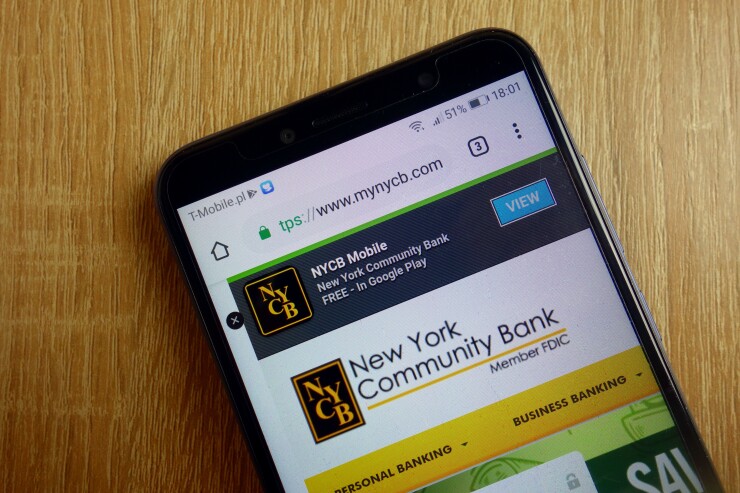Want unlimited access to top ideas and insights?
As earnings season nears its end, the $220 billion-asset
Deposit acquisition has been a key factor across all of these examples. But that dynamic could shift as a result of regulatory changes from the Federal Deposit Insurance Corp.
Officials with the FDIC have been working since 2020 on a proposal that, in addition to
"The changes to the brokered deposit rule contained in this proposal address the fundamental relationship between a bank, a depositor, and a third party intermediary, and the risks the relationship may pose as illustrated by the recent failure of the nonbank deposit broker Synapse Financial," FDIC Chairman Martin Gruenberg said in a
Banks have largely opposed this campaign from the agency since its debut and have recently called for an
Read more:
Where inflation is more broadly concerned, leading credit card issuers like Capital One Financial and American Express have seen consumer spending behavior trending upward to fuel stock market rallies this month.
Bank stocks saw a curious shift in July, however, as Berkshire Hathaway's Chief Executive Warren Buffett sold off about 15% of his firm's $280 billion portfolio in a deal composed of $3.8 billion in Bank of America shares and 20% of its stake in Capital One.
"When I think about Capital One and just a lot of these consumer lenders, broadly, we were in a Goldilocks scenario," Vincent Caintic, a managing director at analytics firm and investment bank BTIG, told American Banker's
Below are top items from earnings season and beyond that savvy investors should know.
Stock markets rally amid shrinking credit card losses

Recent reports from top credit card lenders like Capital One Financial and American Express have shown a decrease in loan charge-off averages as a growing share of consumers acclimate to the elevated interest rate environment, fueling a stock-market upswing this month.
Charge-off averages at credit card issuers fell to 2.14% in July, which is up year over year but decreased from June's average of 2.23%, according to Jon Arfstrom, an analyst at RBC Capital Markets.
Further data highlighted by Arfstrom included slight rises in the number of consumers that were more than 30 days past due on card payments and average delinquencies, which at 1.34% in July was three basis points up from the prior month. This marginal improvement of consumer behavior supported executive claims that "card losses are broadly peaking," Arfstrom said.
Consumer spending is also trending upward. Recent statistics from the
Read more:
Klarna takes aim at banks with financial services campaign

Seeking to challenge the likes of JPMorgan Chase and Bank of America, the Swedish payments and financial services firm Klarna has launched a suite of
Consumers in the U.S. and 11 European countries can move money from their standard bank accounts into the company's digital wallet named Klarna Balance, which will not initially come with deposit insurance from the Federal Deposit Insurance Corp.
Klarna has a banking license in its home country, which allows it to offer consumers interest rates on funds up to 3.58%, but the company hasn't offered insight into what the U.S. strategy looks like.
"It's a hard market to operate when there are so many FDIC-insured institutions," Ariana-Michele Moore, an advisor for retail banking and payments at Datos Insights, told American Banker's
The campaign is just one step of many as Klarna is slated to announce its
Read more:
Warren Buffett offloads bank stocks

The longtime head of Berkshire Hathaway is scaling down
Warren Buffet and Berkshire
These deals represented roughly 15% of the firm's portfolio value, which stood at $280 billion in the second quarter, down from $332 billion, according to public filings.
"It might be a situation where [Buffett] is looking to scoop up a company that falls into distress, like Berkshire typically does," Kevin Heal, a senior analyst at Argus Research, told American Banker's Catherine Leffert. "Maybe on Capital One, he's got some fears of credit card defaults rising, but I think it's more of a strategic teardown of equity exposure."
Read more:
New York Community's stock strategy drives slight rally

New York Community Bank has had its ups and downs over the last year, but a recent stock exchange program has provided the Long Island-based institution with a boost in the markets.
NYCB shares began 2024 at $30.60 but
But an Aug. 13 announcement from the bank that investors such as Liberty 77 Capital, Hudson Bay Capital Management and Reverence Capital Partners all swapped their preferred stock for roughly $200 million in NYCB common stock fueled a slight upswing in the markets, as share prices closed at $10.28 for the day.
"With the bank nearly through its comprehensive internal review and credit analysis, we believe the baton pass to future profitability improvement is likely to be a bit more sporadic (vs. linear) and likely starts to take shape throughout 2025," wrote Citi analyst Ben Gerlinger.
Read more:
KeyCorp's $2.8B boost from Scotiabank helps tackle profitability woes

The Bank of Nova Scotia is extending a $2.8 billion helping hand to KeyCorp as part of an investment strategy that both addresses the Cleveland-based bank's
The deal would yield the Toronto-based Scotiabank a 14.9% stake in KeyCorp, establishing the bank as the largest shareholder, and comes with an agreement that Scotiabank would keep its ownership below 19.9% for the next five years to quell acquisition rumors. In return, KeyCorp leaders can be more aggressive with potentially repositioning its bond portfolio and other areas of operation.
"There's no doubt that this additional capital enables us to be front-footed," KeyCorp Chairman and CEO Chris Gorman told analysts on Aug. 12.
Read more:





